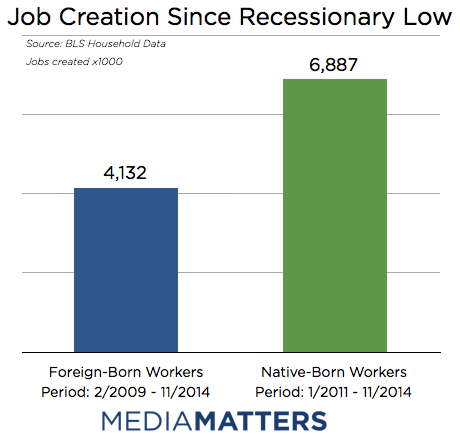Conservative media outlets amplified a misleading study from the anti-immigrant Center for Immigration Studies, which claimed that “all net employment growth has gone to immigrants” between November 2007 and November 2014. But data from the Bureau of Labor Statistics shows that job growth among the native-born has far outpaced job growth among immigrants during the economic recovery.
Right-Wing Media Push Misleading Study Claiming All Job Growth Has Gone To Immigrants
Written by Craig Harrington
Published
Right-Wing Media Promote CIS Claim That Job Growth Has Gone To Immigrants
CIS Study Claims “All Net Employment Growth Has Gone To Immigrants.” A December 2014 study from the Center for Immigration Studies (CIS) claimed that data from the federal Bureau of Labor Statistics (BLS) revealed that “all net employment growth has gone to immigrants” since November 2007:
Yet data published by the Bureau of Labor Statistics on its website (see Table A-7) show that all of the net gain in employment since 2007 has gone to immigrants (legal and illegal), also referred to as the foreign-born. Native employment has still not returned to pre-recession levels, while immigrant employment already exceeds pre-recession levels. Furthermore, even with recent job growth, the number of natives not in the labor force (neither working nor looking for work) continues to increase.
Additional findings:
- The BLS reports that 23.1 million adult (16-plus) immigrants (legal and illegal) were working in November 2007 and 25.1 million were working in November of this year -- a two million increase. For natives, 124.01 million were working in November 2007 compared 122.56 million in November 2014 -- a 1.46 million decrease.
[...]
[Center for Immigration Studies, 12/14]
Wash. Examiner: Foreign-Born Workers Account For “All Net” Job Gains. A December 19 article in the Washington Examiner repeated CIS' findings, claiming that “foreign-born workers account for all net gains in U.S. employment in the past seven years.” [Washington Examiner, 12/19/14]
Daily Caller: CIS Data Finds “Amazing Drop In Employment” Represents A “Job Transfer From Americans To Immigrants.” A December 19 article by The Daily Caller claimed that the “amazing drop in employment” for American-born workers “highlights President Obama's slow recovery” from the 2008 recession. The article suggested that “the job transfer from Americans to immigrants” may be forcing Americans into “lower-wage jobs.” [The Daily Caller, 12/19/14]
National Review Online: Legal And Illegal Immigrants Are Responsible For “All Net Jobs Growth Since 2007.” A December 19 National Review Online post parroted CIS' report, claiming that "[a]ll of the net gains in in jobs since 2007 have gone to immigrants -- both legal and illegal." The post went on to specify that employment for “native-born Americans has decreased more than 1.45 million” from November 2007 to November 2014, while “the number of employed immigrants has risen by more than 2 million” over the same period. [National Review Online, 12/19/14]
Fox & Friends Suggests “All Of The New Jobs” Since 2007 Have “Gone To Foreigners.” During the December 22 edition of Fox News' Fox & Friends, co-hosts Steve Doocy, Elisabeth Hasselbeck, and Brian Kilmeade were joined by Fox Business host Maria Bartiromo to discuss the CIS report. Bartiromo claimed that “all of the new jobs, in fact, since 2007, has gone to foreigners,” alleging that Obama has not prioritized job creation during his administration. [Fox News, Fox & Friends, 12/22/14]
Federal Statistics Show Job Growth Among Natives Has Far Outpaced Job Growth For Immigrants
Since Lows During Recession, There Are 6.9 Million More Jobs Among The Native-Born And 4.1 Million Among The Foreign-Born. According to the BLS, the number of foreign-born workers reached a low of just under 21 million during the recession, in February 2009, and reached a new high of 25.1 million in November 2014 -- an increase of over 4.1 million jobs. The native-born workforce did not reach its low point until January 2011 (115.7 million), and has since recovered to 122.6 million as of November 2014 -- an increase of about 6.9 million jobs.

[Bureau of Labor Statistics, Household Data Table A-7, accessed 12/22/14]
CIS Timeline Inflates Workforce, Ignores Impact Of Recession On Job Market. The CIS review of net employment levels for native and foreign-born workers noted that “native employment has still not returned to pre-recession levels, while immigrant employment already exceed pre-recession levels,” but it made no attempt to investigate the economic downturn. According to the BLS household employment survey, initiating the study in November 2007 places the native-born working population was at a peak, suggesting a larger drop in employment than would have been seen in any other point. [Bureau of Labor Statistics, Household Data Table A-7, accessed 12/22/14]
Experts Say Immigration Is Not Related To Unemployment
Immigration Policy Center: There Is “No Statistically Significant Relationship” Between Immigration and Unemployment. A June 2013 review by the Immigration Policy Center found “no statistically significant relationship” between recent immigration and unemployment (emphasis original):
An IPC analysis of 2011 data from the American Community Survey found that, at the county level, there is no statistically significant relationship between the unemployment rate and the presence of recent immigrants who arrived in 2000 or later. [Immigration Policy Center, 6/12/13]
Brookings Institution: Immigrants “Generally Do Not Compete For The Same Jobs” As Native-Born Americans. According to a September 2010 study by the Brookings Institution's Hamilton Project, many immigrants work in positions that “complement the work of U.S. employees and increase their productivity.” The report stressed that most immigrants do not compete for the same jobs as most Americans:
The most recent academic research suggests that, on average, immigrants raise the overall standard of living of American workers by boosting wages and lowering prices. One reason is that immigrants and U.S.-born workers generally do not compete for the same jobs; instead many immigrants complement the work of U.S. employees and increase their productivity. For example, low-skill immigrant laborers allow U.S.-born farmers, contractors, or craftsmen to expand agricultural production or to build more homes -- thereby expanding employment possibilities and incomes for U.S. workers. [Brookings Institution, 9/10]